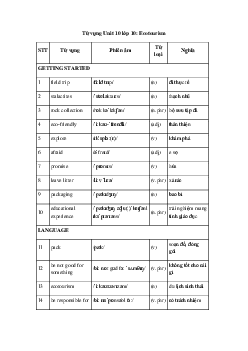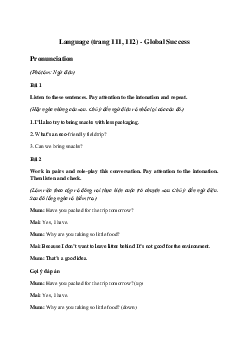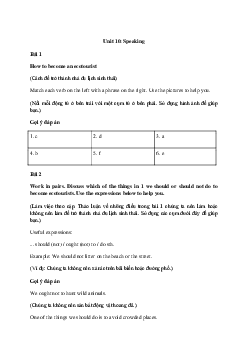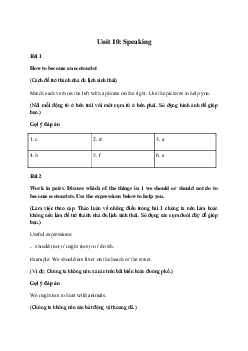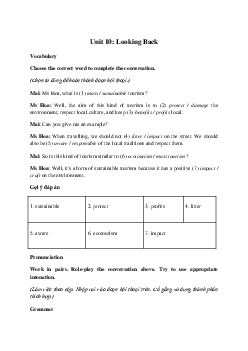








Preview text:
UNIT 10: ECOTOURISM I. PHONETICS
1. Look at the word and transcription and pronounce the word exactly. geography /dʒiˈɒɡrəfi/ interpreter /ɪnˈtɜːrprɪtər/ biology /baɪˈɒlədʒi/ consolidate /kənˈsɒlɪdeɪt/ enthusiast /ɪnˈθjuːziæst/
2. Which syllable usually has stress mark in these words? Do you realize the stress rule of
the words with more than three syllable?
- .............................................................................................................................................
- .............................................................................................................................................
- .............................................................................................................................................
- ............................................................................................................................................. II. VOCABULARY
1. Match the word/ phrase with its definition. No. Word Opt. Definition 1. ecotourism a.
an organized journey to look at, or sometimes hunt, wild animals, especially in Africa 2. rubbish b.
become less active and more calm and happy 3. safari c.
strange, not known or not understood 4. waterfall d.
animals and plants that grow independently of people, usually in natural conditions 5. relax e.
the business of organizing holidays to places that people do not
usually visit in a way which helps local people and does not damage the environment 6. protection f.
land not in towns, cities or industrial areas, which is either used for
farming or left in its natural condition 7. mysterious g.
all the plants of a particular place or from a particular time in history 8. wildlife h.
waste material or things that are no longer wanted or needed 9. flora i.
the act of protecting or state of being protected 10. countryside j.
water, especially from a river or stream, dropping from a higher to
a lower point, sometimes from a great height Your answer: 1. 2. 3. 4. 5. 6. 7. 8. 9. 10.
2. Make a phrase with each of the words in 1. 1. ecotourism: 2. rubbish: 3. safari: Trang 1 4. waterfall: 5. relax: 6. protection: 7. mysterious: 8. wildlife: 9. flora: 10. countryside: III. GRAMMAR I.
Put the verbs into the correct form. 1. If you
(find) a wallet in the street, what would you do with it? 2. I must hurry. My friend (be) annoyed if I (not be) on time. 3. If I (be) a bird, I
(not/ want) to live my whole life in a cage.
4. I didn‟t realize that Gary was in hospital. If I (know) he was in hospital, I (go) to visit him. 5. If you (pour) oil on water, it (float). 6. If the phone (ring), can you answer it? 7. If I (have) wings, I
(not/ have to) take an airplane to fly home.
8. Ken got to the station in time to catch his train. If he (miss) it, he (be) late for his interview.
9. A: What shall we do tomorrow? B: Well, if it (be) a nice day, we (go) to the beach. 10. A: You look tired. B: Well, if you
(not/ wake) me up in the middle of the night, I (not be) tired.
II. Write a sentence with if for each situation.
1. You should take more exercise because that‟s the way to get fit.
2. The accident happened because the driver in front stopped so suddenly.
3. I haven‟t got a key, so I can‟t get in.
4. Throw a stone into water and it sinks.
5. I didn‟t have any breakfast, and now I‟m hungry.
6. Road travel is cheaper than rail travel in this country, so we have lots of traffic jams.
7. Martin failed his driving test last week. He was very nervous and that‟s why he failed.
8. You may want a chat, so just give me a ring.
9. I didn‟t finish my report yesterday, so I can‟t begin a new project today. Trang 2
10. The wind is blowing hard, so I won‟t take the boat out for a ride.
III. Choose the correct answer. 1. If I were you, I
that coat. It‟s much too expensive. a. won‟t buy b. don‟t buy c. wouldn‟t buy d. didn‟t buy
2. If I could speak Spanish, I next year studying in Mexico. a. will spend b. had spent
c. would have spent d. would spend
3. It would have been a much more serious accident fast at the time. a. was she driving b. she had driven c. had she been driving d. if she drove
4. „Can I borrow your car this evening?‟ „Sure, but Nora‟s using it right now. If she
back in time. You‟re welcome to borrow it.‟ a. brought b. would ring c. will bring d. brings 5. If energy
inexpensive and unlimited, many things in the world would be different. a. is b. will be c. would be d. were 6. We
the game if we‟d had a few more minutes. a. could have won b. won c. had won d. will win 7. I
William with me if I had known you and he didn‟t get along with each other. a. hadn‟t brought b. didn‟t bring c. wouldn‟t have brought d. won‟t bring.
8. The lecturer last night didn‟t know what he was talking about, but if Dr. Mason
I would have listened carefully. a. lectured
b. had been lecturing c. was lecturing d. would lecture 9. If you
to my advice in the first place, you wouldn‟t be in this mess right now. a. listened b. will listen c. had listened d. listen 10.
interested in that subject, I would try to learn more about it. a. If I am b. Should I c. I was d. Were I 11. If I
the same problems you had as a child, I might not have succeeded in life as well as you have. a. have b. would have c. had had d. should have 12. I
you sooner had someone told me you were in hospital.
a. would have visited b. visited c. had visited d. visit 13.
more help, I could call my neighbor. a. Needed b. Should I need c. I have needed d. I should need 14.
then what I know today, I would have saved myself a lot of time and trouble over the years. a. If I know b. If I would know c. Did I know d. Had I known
15. Do you think there would be less conflict in the world if all people the same language? a. speak b. will speak c. spoke d. had spoken IV.
Write a new sentence with the same meaning. Use UNLESS in your sentence.
1. You don‟t get there in time if you don‟t hurry.
2. We can‟t do the job if we don‟t get help. Trang 3
3. You are allowed into the club only if you‟re member.
4. I don‟t like fish. I wouldn‟t eat it if I wasn‟t extremely hungry.
5. Don‟t leave the TV on if you aren‟t watching it.
6. The doctor will see you today only if it‟s an emergency.
7. I wouldn‟t have bought the picture if I didn‟t like it.
8. You can‟t get a driver's license if you‟re not at least eighteen years old.
9. I‟m going to the party only if you go with me.
10. The dog will attack you only if you move suddenly.
V. Make sentences with the same meaning by omitting if.
1. If you should need more money, go to the bank before six o‟clock.
2. If I were you, I wouldn‟t do that.
3. If they had realized the danger, they would have done it differently.
4. If I were your teacher, I would insist you do better work.
5. If you should change your mind, please let me know immediately.
6. She would have gotten the job if she had been better prepared.
7. Your boss sounds like a real tyrant. If I were you, I would look for another job.
8. If you should need to reach me, I‟ll be at the Hilton Hotel in Seoul.
VI. Complete the following sentences with your own ideas.
1. I like to walk to work in the morning unless 2. What would happen if I
3. You can borrow the money providing
4. Take a sandwich with you in case
5. You wouldn‟t have felt ill if you
6. If he had listened to my advice, he
7. You won‟t pass the exam unless 8. If you see Jane, 9. Were I your doctor
10. There would be less pollution if IV. READING
1. Read the passage and answer the questions. Trang 4
Of all the natural wonders of the world, few are as spectacular as Niagara Falls. Located on
the Niagara River along the border between the United States and Canada, Niagara Falls
actually consists of two falls, the American Falls and the Horseshoe Falls. The former is on
the US side of the border, in the state of New York, while the later is on the Canadian side.
About 85% of the water in Niagara River flows over the Horseshoe Falls, which is the most impressive of the two falls.
About 10 million people visit the falls each year, most during the summer tourist season.
Sightseers can ride steamers up close to the boiling water of the falls, or view them from the
parks on both sides of the river. Niagara has long been a popular honeymoon destination for newlyweds.
1. Where are the Niagara falls?
2. Which fall is in the state of New York?
3. Which fall is the most impressive?
4. How many people visit the falls each year?
5. What can the tourist do when they visit Niagara falls?
2. Fill in each blank space with one appropriate from the box. visible network conservative Astronauts monument
structure discernible designated measured dispelled
The Great Wall is probably China's best-known (1) and one of its mast
popular tourist destinations. In 1987 it was (2) a World Heritage Site by the
United Nations Educational, Scientific and Cultural Organization (UNESCO). The Great Wall is not a single, continuous (3)
. Rather, it consists of a (4) of walls and
towers that leaves the frontier open in places. Estimates of the total length of the monument vary,
depending on which sections are included and haw they are (5) . The Great Wall is
about 2,400 km (about 1,500 mi) long, according to (6) estimates, other estimates
cite a length of 6,400 km (4,000 mi), or even longer. Some long-standing myths about the wall have been (7)
in recent decades. The existing wall is hat several thousand years
old, nor is it, as has been widely asserted, (8)
with the naked eye from outer space. (9)
have confirmed this. However, same of the wall is (10) in special
radar images taken by satellites. V. SPEAKING
Cuc Phuong National Park
Cuc Phuong National Park is located in Ninh Binh Province, in Vietnam's Red River Delta.
Cuc Phuong was Vietnam's first national park and is the country's largest nature reserve. The
park is one of the most important sites for biodiversity in Vietnam. Flora and fauna
Cuc Phuong is home to an amazing diversity of flora and fauna. Inhabitants of the park
include 97 species of mammals, most notable endangered langurs; 300 species of birds; 36
reptilian species; 17 species of amphibians; 11 species of fish; 2,000 species of vascular
plants, and thousands of species of insects. A number of species in the park are listed on
Vietnam Red Book of endangered species. Tourists can walk in the park and watch lots of
endangered animals and plants here. Trang 5 Tourism
Cuc Phuong National Park is one of the most popular natural destinations in Vietnam. Tens
of thousands of Vietnamese and a steady stream of foreign tourists visit the park each year.
Lodging and restaurant facilities are available at the park's entrance and within the park. A
paved road cuts into the park and a number of paths for hiking are maintained. Park rangers
patrol Cuc Phuong and provide guided tours for a fee.
Other nearby tourist destinations located in Ninh Binh Province include Phat Diem
Cathedral, Hoa Lu Ancient Capital, Tam Coc - Bich Dong, Trang An. 1. Answer the questions.
1. Where is Cuc Phuong National Park?
2. How about the fauna and flora in it?
3. What can tourist do and see in it?
4. How many tourists visit the park each year?
5. What are the other nearby destinations that tourists can visit?
2. Make a short talk to introduce Cuc Phuong National Park to foreigners tourists. The
questions in 1 are suggestions for you. Report your answer in oral speech and record your talk. VI. WRITING
1. List five advantages of ecotourism. - - - - -
2. Write a short paragraph about advantages of ecotourism. Using the ideas in 1 as your suggestions. ĐÁP ÁN UNIT 10: ECOTOURISM I. PHONETICS
www.thuvienhoclieu.com Trang 6
1. Look at the word and transcription and pronounce the word exactly.
The word with more than three syllable: Stress is on the third syllable from the bottom. geography /dʒiˈɒɡrəfi/ interpreter /ɪnˈtɜːrprɪtər/ biology /baɪˈɒlədʒi/ consolidate /kənˈsɒlɪdeɪt/ enthusiast /ɪnˈθjuːziæst/
2. Which syllable usually has stress mark in these words? Do you realize the rule?
- The word with more than three syllable: Stress is on the third syllable from the bottom. II. VOCABULARY
1. Match the word/ phrase with its definition. 1. e 2. h 3. a 4. j 5. b 6. i 7. c 8. d 9. g 10. f
2. Make a phrase with each of the words in 1.
1. ecotourism: Would you like go out for an ecotourism?
2. rubbish: We need to recycle rubbish to protect environment.
3. safari: We want to have a safari in the forest.
4. waterfall: There is a big and beautiful waterfall in Canada.
5. relax: I‟m so busy that I don‟t have time to relax.
6. protection: The protection of the environment must be our first priority today.
7. mysterious: These mysterious creatures live at the bottom of the ocean.
8. wildlife: The use of pesticides is killing off birds, fish and wildlife.
9. flora: The flora in this land is so various.
10. countryside: I dislike walking and I hate the countryside. III. GRAMMAR I.
Put the verbs into the correct form. 1. found 6. rings 2. will be - am not 7. had - wouldn‟t have to 3. were/was - wouldn‟t want
8. had missed - would/ might have been
4. had known - would have gone 9. is - will/can go 5. pour - will float/ floats
10. hadn‟t woken - wouldn‟t be
II. Write a sentence with if for each situation.
1. If you take more exercise, you‟ll/ you will get fit.
2. If the driver in front hadn‟t stopped suddenly, the accident wouldn‟t have happened.
3. If I had a key, I could get in.
4. If you throw a stone into water, it sinks/ it‟ll sink.
5. If I‟d/1 had had (some) breakfast, I wouldn‟t be hungry now. 6.
If road travel wasn‟t/ weren‟t cheaper than rail travel, we wouldn‟t have lots of traffic jams, or If
road travel was I were expensive than rail travel,...
7. If Martin hadn‟t been very nervous, he wouldn‟t have failed his driving test last week.
8. If you want a chat, just give me a ring.
9. If I‟d/I had finished my report yesterday, I could begin a new project today.
10. If the wind weren‟t/ wasn‟t blowing hard, I‟d/I would take the boat out for a ride.
www.thuvienhoclieu.com Trang 7
III. Choose the correct answer. 1. c 6. a 11. c 2. d 7. c 12. a 3. c 8. b 13. b 4. d 9. c 14. d 5. d 10. d 15. c
IV. Write a new sentence with the same meaning. Use UNLESS in your sentence.
1. You don‟t get there in time unless you hurry.
2. We can‟t do the job unless we get help.
3. You aren‟t allowed into the club unless you‟re member.
4. I don‟t like fish. I wouldn‟t eat it unless I was extremely hungry.
5. Don‟t leave the TV on unless you are watching it.
6. The doctor won‟t see you today unless it‟s an emergency.
7. I wouldn‟t have bought the picture unless I liked it.
8. You can‟t get a driver‟s license unless you are at least eighteen years old.
9. I‟m not going to the party unless you go with me.
10. The dog won‟t attack you unless you move suddenly.
V. Make sentences with the same meaning by omitting if.
1. Should you need more money, go to the bank before six o‟clock.
2. Were I you, I wouldn‟t do that.
3. Had they realized the danger, they would have done it differently.
4. Were I your teacher, I would insist you do better work.
5. Should you change your mind, please let me know immediately.
6. She would have gotten the job had she been better prepared.
7. Your boss sounds like a real tyrant. Were I you, I would look for another job
8. Should you need to reach me, I‟ll be at the Hilton Hotel in Seoul.
9. I wouldn‟t have known about your new job had I not talked to your mother.
10. Were she ever in trouble, I‟d do anything I could to help her.
VI. Complete the following sentences with your own ideas. 1. I'm in a hurry.
6. wouldn‟t be in this mess. 2. press this button? 7. you work much harder.
3. you pay it back as soon as possible. 8. will you give her a message? 4. you get hungry.
9. I‟d/I would insist you stop smoking. 5. hadn‟t eaten so much.
10. there weren‟t too much traffic. IV. READING
1. Read the passage and answer the questions.
1. They are on the Niagara River along the border between the United States and Canada. 2. American Fall is. 3. Horseshoe Fall is.
4. About ten million people visit the falls each year.
5. They can ride steamers up close to the boiling water of the falls, or view them from the parks on both sides of the river.
2. Fill in each blank space with one appropriate from the box. 1. monument 2. designated 3. structure 4. network 6. conservative 7. dispelled 8. visible 9. Astronauts
www.thuvienhoclieu.com Trang 8 V. SPEAKING 1. Answer the questions.
1. Cue Phuong National Park is located in Ninh Bình Province, in Vietnam's Red River Delta.
2. How about the fauna and flora in it?
The fauna and flora is very various with 300 species of birds; 36 reptilian species; 17 species
of amphibians; 11 species of fish; 2,000 species of vascular plants, and thousands of species of insects.
3. What can tourist do and see in it?
They can walk in the park and watch lots of endangered animals and plants here.
4. Tens of thousands of Vietnamese and a steady stream of foreign tourists visit the park each year.
- They can visit other destinations such as Phat Diem Cathedral, Hoa Lu Ancient Capital,
Tam Coc - Bich Đong, Trang An.
2. Make a short talk to introduce Cuc Phuong National Park to foreigners tourists. The
questions in 1 are suggestions for you. Report your answer in oral speech and record your talk. VI. WRITING
1. List five advantages of ecotourism.
- Ecotourism has minimal impact on the environment
- It help to build awareness and respect for the local culture and environment
- It offers positive experiences for tourists.
- It brings more jobs and and benefits to local people
- It helps to protect wildlife habitat.
2. Write a short paragraph about advantages of ecotourism. Using the ideas in 1 as your suggestions.
Ecotourism is relating to travelling to areas of natural or ecological interest to observe
wildlife and learn about the environment. It‟s a good type of tourism and it brings lots of
benefits. Firstly, it has minimal impact on the environment. Moreover, money from the tourist
can go back conservation of the environment. Through ecotourism, we can build awareness
and respect for the culture and environment at tourist. This experience will brings tourists
both the consciousness of protecting environment and fun. The most important thing is that
ecotourism helps to protect wildlife habitat. We don‟t have to cut down trees but plant more
trees and protect our natural environment.
www.thuvienhoclieu.com Trang 9
